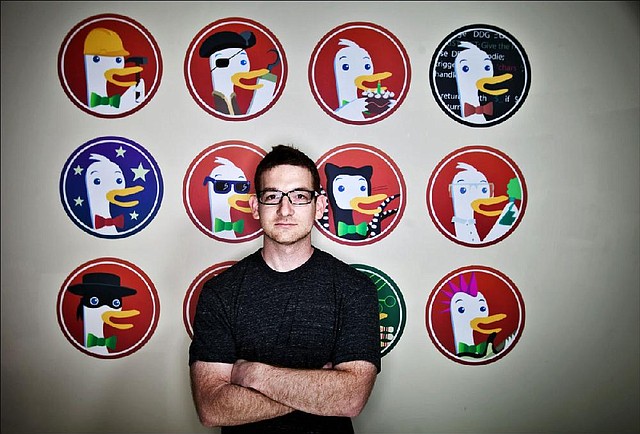DuckDuckGo flies in face of Google
Search engine pits its agility, filtering style against giants
Gabriel Weinberg is creator of DuckDuckgo.com, a new Internet search engine that does not track histories and personal information.
Monday, November 19, 2012
PAOLI, Pa. — Not far from Valley Forge, around the corner from Bravo Pizza, up the road from Paoli Auto Body, there is an odd-looking office building that resembles a stone castle. An eye doctor is on the first floor. On the second floor is a search engine.
The proprietor of the search engine is Gabriel Weinberg, 33. A few years ago, when Weinberg told his wife about his new business idea - to go up against more established outfits such as Google and Bing - he admits that she briefly thought he was nuts.
“She was like, ‘What are you doing?’ ” Weinberg said. “She thought the idea was crazy.”
Her argument was hard to rebut. But Weinberg is not delusional. Using $10 million from the sale of another startup, Weinberg bet there was a place in the market for a product that capitalized on users’ emerging annoyances with Google - search results gamed by marketers; pages cluttered with ads; every query tracked, logged and personalized to the point of creepiness.
He called his little search engine project DuckDuckGo, after the children’s game Duck, Duck, Goose. (Instead of “Just Google it,” think “Just Duck it.”)
“My thesis for the company was, what can we do that other search engines, because they’re big, can’t do easily?” Weinberg said. “Because what’s good for Google business is bad for Google users.”
So DuckDuckGo does not track users. It doesn’t generate search results based on a user’s previous interests, potentially filtering out relevant information. It is not cluttered with ads. In many ways, DuckDuckGo is an homage the original Google - a pure search engine - and its use is soaring, with searches up from 10 million a month in October 2011 to 45 million this past October.
The growth has attracted attention and cash from Union Square Ventures, the venture capital firm behind Twitter. Not long ago, a headline in the search industry bible SearchEngineLand.com asked: “Could DuckDuckGo Be The Biggest Long-Term Threat To Google ?”
The attention to DuckDuckGo comes as U.S. and European Union officials are stepping up scrutiny into Google’s search practices, which have been criticized for unfairly elbowing out competitors’ content and results in favor of its own.
Earlier this year, in a response to criticism that it was acting monopolistically, Google publicly identified DuckDuckGo as a competitor - which pleased and entertained Weinberg but also reflected a bit of marketing hyperbole about the threat of DuckDuckGo: Google processes billions of searches a day. DuckDuckGo processes millions.
“The reality in the United States is that we still really only have two search engines: Google and Bing,” said Danny Sullivan, editor of SearchEngineLand.com. “I think it’s entirely unlikely that DuckDuckGo is gonna put Google on its back and crush it.”
But what if that’s not really Weinberg’s goal?
Weinberg started his first company at MIT: A portal for teachers to put lesson plans online. He was too early. He failed. While living in Boston, he started another company after graduating: A database where users could submit their e-mail addresses and other people could pay to get in touch with them. It was called NamesDatabase. In 2006, he sold it to Classmates.com for $10 million.
Weinberg started DuckDuckGo while his wife worked and he captained the house. The company was based at home until last year, when he raised money from Union Square. He is joined at his new office by several coders, one of whom brings his dog, Hex.
His goal was to build a search engine that would be quick and pure, focusing on the first two or three results that users saw. Since he didn’t have the manpower to build a search engine from scratch, Weinberg decided to use publicly available search results from Yahoo - which is now fueled by Bing - for the bulk of his searches and then use his programming talents to sift the top few links to provide answers.
For example, going to Google and typing “calories in a banana” will produce a page of links about bananas. Going to DuckDuckGo and typing “calories in a banana” will produce an answer: 105. The answer comes from WolframAlphra, a computational database that Weinberg linked to DuckDuckGo.
He has linked hundreds of millions of popular searches to other outside data sources, such as Wikipedia and Yelp.
“If you can control the top three links, you’re actually controlling 80 to 90 percent of searches,” he said.
While Weinberg’s answer system was intentional, his focus on privacy was not. It simply didn’t occur to him that he would ever need to track users. Why? Because his business model would eventually call for serving up just one or two easy-to miss ads based on the search query, which would generate enough revenue to cover his costs.
Weinberg’s goals mean that he can do things that Google or Bing can’t because it could damage their business models.
“We think it’s the right time and the right platform to take a crack at this market,” said Brad Burnham, managing partner of Union Square. “At what point does the breadth of Google’s ambitions begin to diminish its focus on its core asset and open up an opportunity for a competitor?”
While Sullivan, of Search-EngineLand.com, agrees that Google is vulnerable, particularly with intense government scrutiny, so far its market share has not taken a hit. He also points out that if DuckDuckGo becomes too successful, the data sources Weinberg relies on could cut him off. Also, Google could easily copy any innovations that Weinberg devises.
Business, Pages 21 on 11/19/2012
